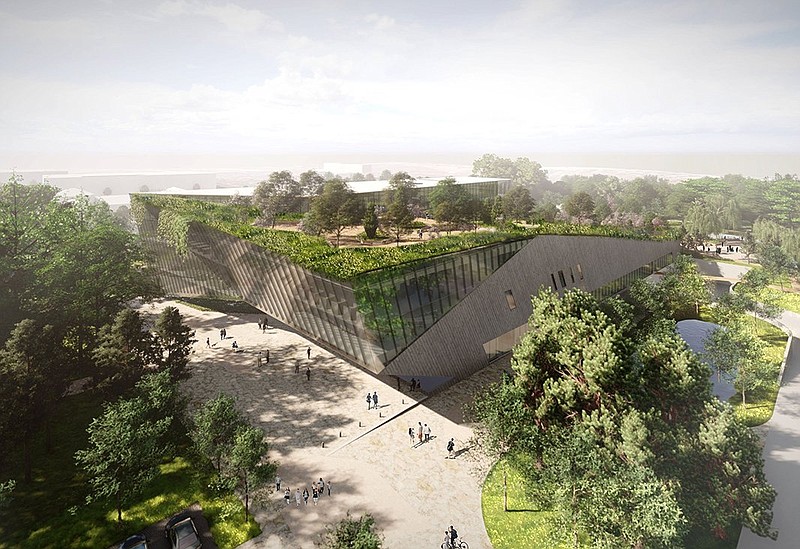An estimated $240 million spent on health care for Medicare enrollees in Northwest Arkansas was spent outside the region in 2019, a recent analysis of pre-pandemic data shows.
The analysis of Medicare data, released last month by the Arkansas Center for Health Improvement, adds numbers to previous estimates nearly $1 billion a year in health care revenue is spent outside of Northwest Arkansas by the region's residents.
A total of $1.1 billion was paid for health care services and prescriptions for Northwest Arkansas' Medicare enrollees in 2019, according to the analysis. About $240 million, or 22%, was for services and prescriptions outside of the region, including $79 million elsewhere in Arkansas and $161 million outside the state.
Medicare enrollees are generally 65 or older, though some people may be eligible earlier due to disability, according to the U.S. Department of Health and Human Services.
The data seem to show population growth in Northwest Arkansas exceeded the health care system's capacity even before the covid-19 pandemic, according to Dr. Joe Thompson, president and CEO of the nonpartisan health policy center. The regional circumstances are different than some other parts of the state, where rural hospitals may be struggling and the population may not be growing, he said. Several rural hospitals in Arkansas are at immediate risk of closing, according to the national policy organization Center for Healthcare Quality and Payment Reform.
Of cardiology procedures done on Northwest Arkansas Medicare enrollees in 2019, about 11% -- or 8,989 out of 80,238 -- were outside the region. Specific procedures such as heart valve replacement and coronary artery bypass grafting saw higher percentages of 20% and 14%, respectively. Of the 8,989 cardiology procedures outside the region, 6,554 were done outside Arkansas, according to the analysis.
Cardiology is one of the most in-demand types of specialty care, according to the center. Heart disease, a general term encompassing multiple heart conditions, is the most common cause of death in the U.S., according to the federal Centers for Disease Control and Prevention.
The study doesn't include the reasons individuals left for care, though residents may leave the region for a combination of reasons, according to Ryan Cork, executive director of the Northwest Arkansas Council's health care division.
Some residents may not be able to find the treatment they need in the region, but others might expect better outcomes from outside providers, he said.
The issue is significant because of both the personal and economic toll of traveling to receive treatment as well as the economic impact of those dollars leaving and supporting another region, he said. Keeping people in need of health care close to home is best for them and their families, but also the local economy and health systems, he said.
One recent study suggests people who go to larger health systems often see higher costs, but not necessarily better outcomes, he said.
"If they're spending extra dollars to receive care somewhere else, we want them to get that care here," he said. "I want us to be that medical destination."
WORKFORCE WOES
Population growth will likely continue to strain the availability of health care services in the region, according to Thompson.
The health of individual Arkansans needs to improve so they require fewer services, but more physicians and nurses are also necessary, he said.
Northwest Arkansas' health care workforce has faced new challenges during the last three years, according to Cork. The region has seen a higher attrition rate in health care jobs due to retirement and career changes since the beginning of the pandemic, he said.
Five of the region's nine cardiothoracic surgeons performing coronary artery bypass grafting surgery were older than 60 in 2019, according to the Arkansas Center for Health Improvement analysis.
The Northwest Arkansas Council, a nonprofit organization with members from the region's largest business, education and health care organizations, published a report in 2019 estimating the area is missing out on nearly $1 billion a year in health care revenue, largely because people travel elsewhere for specialty care.
More Doctors
Recommendations in the 2019 report included expanding educational opportunities and increasing the number of health care workers. Those recommendations included expanding the region's graduate medical education, developing an interdisciplinary research institute and establishing a medical school.
New graduate medical education programs have since been announced by the University of Arkansas for Medical Sciences Northwest Regional Campus and Washington Regional Medical Center. Those programs are expected to bring an estimated 92 residency slots to the region by 2030, according to the organizations.
A new Bentonville medical school, the Alice L. Walton School of Medicine, also hopes to welcome its first class of 48 students in 2025.
Last year, the Alice L. Walton Foundation and Washington Regional Medical System announced a joint initiative to expand access to specialty care by creating a regional health system.
Data for the analysis was gathered from the Arkansas Healthcare Transparency Initiative, which includes the Arkansas All-Payer Claims Database. The initiative is administered by the Arkansas Center for Health Improvement. Benton, Washington, Madison and Carroll counties were all included in the analysis.
Later this year, the center plans to use additional data to provide a more complete picture of where money is spent on health care by Northwest Arkansas residents, Thompson said. Future analyses will include data on other specialty services as well as information on residents who are not Medicare enrollees, he said. A statewide health care workforce report will also be released by the center this year, he said.

